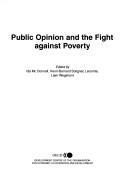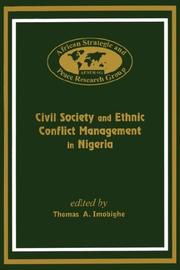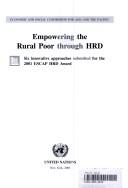| Listing 1 - 10 of 51 | << page >> |
Sort by
|
Digital
ISBN: 9789264299993 9789264299986 Year: 2003 Publisher: Paris OECD
Abstract | Keywords | Export | Availability | Bookmark
 Loading...
Loading...Choose an application
- Reference Manager
- EndNote
- RefWorks (Direct export to RefWorks)
Il ne sera possible de poursuivre la lutte contre la pauvreté dans le monde que si la « société civile » au sens large, c’est-à-dire les citoyens des pays riches, soutient activement et de façon déterminante les efforts internationaux de coopération pour le développement. La bonne volonté est là sans aucun doute. McDonnell, Solignac Lecomte et Wegimont (2003) montrent que dans les pays membres du CAD/OCDE, le soutien de l’opinion publique à l’aide consentie aux pays pauvres n’a pas faibli depuis près de vingt ans. Il n’y a pas de lassitude à l’égard de l’aide. On en veut pour preuve le fait que les dons aux ONG qui s’occupent d’aide d’urgence et de développement augmentent régulièrement même si, pour l’essentiel, ces dons répondent à des situations de crise ou à des catastrophes naturelles survenant dans des pays en développement. L’opinion publique s’interroge sur l’efficacité de l’aide mais parallèlement elle continue de la soutenir fortement. Cependant, les problèmes de pauvreté et de développement ne sont compris que de façon très superficielle. De même, les politiques en matière de coopération pour le développement et d’aide publique au développement (APD) sont peu connues du grand public. La prise de conscience progresse grâce à l’éducation, aux campagnes de sensibilisation et au débat public, mais les médias demeurent la première source d’information sur les pays en développement. On note cependant un certain scepticisme à l’égard de la nature de cette information. Dans ce contexte, les dépenses publiques consacrées à l’enseignement et à l’information sur les programmes d’aide nationaux ont beau augmenter dans certains pays de l’OCDE, elles demeurent dans l’ensemble à des niveaux très faibles. En particulier, l’adoption des Objectifs du millénaire pour le développement n’a pas été suffisamment mise à profit pour renforcer les efforts destinés à informer et susciter l’adhésion de l’opinion publique. Le consensus mondial contre la pauvreté dont ils sont le fer de lance ne se reflète guère dans les débats publics nationaux lesquels, à quelques exceptions près, sont relativement rares et superficiels. Cependant, les différents sondages et études sur l’attitude de l’opinion publique envers la coopération au développement dans les pays de l’OCDE montrent que les citoyens souhaitent sans ambiguïté plus de solidarité et de justice dans le monde. Ils sont favorables à la coopération internationale pour le développement et ils seraient sans doute de précieux soutiens pour sa réforme et son amélioration s’ils étaient plus et mieux informés et s’ils pouvaient participer plus directement au débat politique. Les gouvernements, en particulier ceux qui se sont engagés à accroître leur APD, ont là une occasion d’amorcer un cercle vertueux de transparence et de réforme et de relever le défi de la lutte contre la pauvreté dans le monde.
Book
Abstract | Keywords | Export | Availability | Bookmark
 Loading...
Loading...Choose an application
- Reference Manager
- EndNote
- RefWorks (Direct export to RefWorks)

ISBN: 9264199985 9789264199996 9789264199989 Year: 2003 Publisher: Paris OECD
Abstract | Keywords | Export | Availability | Bookmark
 Loading...
Loading...Choose an application
- Reference Manager
- EndNote
- RefWorks (Direct export to RefWorks)
Sustaining the fight against global poverty will be possible only if the "wider civil society", i.e. citizens in richer countries, actively and critically support international development co-operation efforts. The willingness undoubtedly exists: McDonnell, Solignac Lecomte and Wegimont (2003) found that public support in OECD DAC member countries for helping poor countries has remained consistently high for almost two decades. There is no aid fatigue. One indication is that donations from the public to development and emergency NGOs have been steadily increasing, although mostly in reaction to emergencies and natural disasters in developing countries. There is concern among the public about aid effectiveness, but it exists alongside continued high support for aid. However, people’s understanding of poverty and development issues remains very shallow. Similarly, public awareness about official development assistance (ODA) and development co-operation policies is low. Awareness does increase significantly as a result of global education, awareness raising campaigns and public debate, but the media remain a primary source of information about developing countries. However, there is some evidence of scepticism about the nature of the information. Against this background, official expenditure on global education and on information about national aid programmes, although it has been increasing in some OECD countries, remains very low. In particular, the adoption of the Millennium Development Goals so far largely remains an untapped opportunity to peg more vigorous efforts to inform and engage the public. The global anti-poverty consensus they are spearheading has hardly trickled down to national public debates, which remain (with a few noticeable exceptions) rather rare and unsophisticated. Still available evidence shows that citizens in OECD DAC member countries want more solidarity and justice in the world. They support international development co-operation, and if they were more and better informed, if their capacity to critically engage in the policy debate was stronger, they could be a precious constituency for its reform and improvement. There lies an opportunity for governments, especially those that have pledged to increase their ODA, to kick-start a virtuous circle of transparency and reform, and effectively rise to the challenge of global poverty reduction.
Book
Year: 2003 Publisher: Brussel
Abstract | Keywords | Export | Availability | Bookmark
 Loading...
Loading...Choose an application
- Reference Manager
- EndNote
- RefWorks (Direct export to RefWorks)

ISBN: 0796920303 Year: 2003 Publisher: Cape Town HSRC
Abstract | Keywords | Export | Availability | Bookmark
 Loading...
Loading...Choose an application
- Reference Manager
- EndNote
- RefWorks (Direct export to RefWorks)

ISBN: 9780294848 Year: 2003 Publisher: Ibadan Spectrum
Abstract | Keywords | Export | Availability | Bookmark
 Loading...
Loading...Choose an application
- Reference Manager
- EndNote
- RefWorks (Direct export to RefWorks)

ISBN: 9211201357 Year: 2003 Publisher: New York, N.Y. United Nations
Abstract | Keywords | Export | Availability | Bookmark
 Loading...
Loading...Choose an application
- Reference Manager
- EndNote
- RefWorks (Direct export to RefWorks)
Social stratification --- Social change --- Personnel management --- Asia

ISBN: 9781859736289 9781859736234 1859736289 1859736238 1474215076 1845205529 9786610339228 1280339225 Year: 2003 Publisher: Oxford ; New York : Berg,
Abstract | Keywords | Export | Availability | Bookmark
 Loading...
Loading...Choose an application
- Reference Manager
- EndNote
- RefWorks (Direct export to RefWorks)
Symbolizing both commerce and culture, London has always been a magnet for the ambitions of the middle classes. However, the past three decades have witnessed a dramatic fragmentation in inner-city Londons social map. New and highly distinctive middl e-class neighbourhoods have sprung up where embattled workers seek to combat the deleterious effects of long working hours, travel, and stress on traditional family values. This book is the first to explore the powerful impact of globalization on Lon dons economy and those who are caught up in it. More and more people are responding to the negativ.
Middle class --- Gentrification --- History --- Social stratification --- Sociology of environment --- London
Book
Abstract | Keywords | Export | Availability | Bookmark
 Loading...
Loading...Choose an application
- Reference Manager
- EndNote
- RefWorks (Direct export to RefWorks)
Social stratification --- Social problems --- Hygiene. Public health. Protection --- Europe
Book
Year: 2003 Publisher: Kinshasa CEPAS
Abstract | Keywords | Export | Availability | Bookmark
 Loading...
Loading...Choose an application
- Reference Manager
- EndNote
- RefWorks (Direct export to RefWorks)
Social ethics --- Christian theology --- Social stratification --- Social problems --- Congo
| Listing 1 - 10 of 51 | << page >> |
Sort by
|

 Search
Search Feedback
Feedback About UniCat
About UniCat  Help
Help News
News